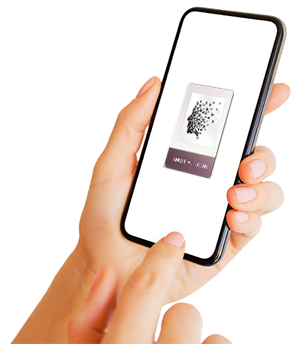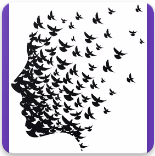Fear of being touched
Here you find Sie background information, a fear test and an effective approach to treating the fear of being touched.
6 min reading time.
Fear of being touched is one of the specific fears and can also be a so-called isolated phobia. This type of fear or phobia relates either to a specific situation or to a specific object, which is generally considered harmless. The fear is therefore objectively unfounded. For example, the fear can occur whenever contact with another person is required by the social situation, such as when shaking hands to greet someone, or can hardly be avoided due to spatial conditions, such as on a crowded bus.
The fear of being touched can occur within different disorders and has a very different background depending on the disorder. For example, the fear of being touched occurs in people who have a pathological fear of infections and illnesses. However, it also plays a role in connection with fear of closeness. There are therefore different forms of fear of being touched.
The term aphephosmophobia is used to describe the fear of being touched by other living beings. Those affected usually suffer from a fear of being touched by strangers and less familiar people. However, it can also relate exclusively to people of the opposite sex, depending on what caused the phobia. The fear can also be limited to direct physical contact by hands, such as within a fear of infection, but it can also be extended to fleeting touching in passing, for example by a mere brushing of the sleeves. The degree of severity and generalization of the fear therefore varies greatly among people with touch phobia. This is related to the individual history and the overall clinical picture.
In general, therefore, it does not matter whether the contact with or by another person is intentional or accidental. In any case, the affected person has a great panic about being touched and avoids any situation that could trigger fear. The fear of touch often occurs in connection with other mental disorders, for example together with depression, which even has an intensifying effect on the phobia. Or the fear of touch is merely part of another mental disorder. After sexual abuse, for example, it can occur as part of a post-traumatic stress disorder.
Fear of being touched symptoms
If an aphephosmophobic person is touched despite their avoidance tendency, the subsequent anxiety reaction is accompanied by psychological and physical symptoms. Depending on the severity of the pathological fear and the intensity of the touch, the phobic person feels slight discomfort or even panic, which can lead to fainting. The symptoms of anxiety after being touched are typically palpitations and sweating as well as an accelerated pulse, sometimes a dry mouth, trembling and breathing difficulties, hot flushes and dizziness.
However, not every touch triggers anxiety. Normally, hugs and other contact with close people, such as family or long-time friends, are unproblematic. Those affected only gradually gain confidence with new people.
The impact of aphephosmophobia on the person affected and their life depends on how severe it is and what it is based on or whether it is present within or paired with another mental illness. In any case, the fear of being touched leads to avoidance of situations that could potentially lead to touching. Depending on whether the fear of touch stems from the fact that the affected person wants to protect themselves from bacteria and pathogens by avoiding skin contact or whether they are afraid of intimacy and closeness, they will avoid other situations. These may be formal occasions such as receptions, visits to the doctor, but also meetings of a private nature. For some, the fear relates to being touched by people of the opposite sex, because sexual intentions are assumed to be behind it. Others are only afraid of germs and increasingly avoid hand contact. Still others suffer from a social phobia and avoid social events such as going to a nightclub. In addition, autistic people may have a fear of touch if they are unable to understand the significance of touch on an interpersonal communication level.
The life of a person affected by aphephosmophobia can be considerably restricted if they avoid many social situations where touching is likely due to their severe fear. Even at job interviews, the hurdle for people with touch anxiety begins in everyday life. Finding a partner and partnership are just as much a part of life. However, for those who are afraid of being touched, this area presents considerable difficulties. Their phobia stands in the way of getting to know someone better, even if the desire to get close and be intimate with someone is there.
Depending on the severity of the aphephosmophobia, this can lead to considerable restrictions in everyday life as a whole or in certain areas. In extreme cases, social withdrawal can even lead to isolation.
Fear of touching causes
How the fear of being touched arises can again have individual causes. It depends on the extent to which the fear of touch occurs together with other psychological conditions.
However, the reason for the phobia usually lies in early childhood experiences. For example, any kind of abuse in childhood and adolescence, whether through violence or sexual coercion, can lead to fear and avoidance of contact with other people in adulthood. If an anxiety disorder develops as a result of traumatic experiences, which can also include bullying, aphephosmophobia can be a component of the disorder. For example, one symptom of a social phobia can be avoiding too much closeness. Low self-confidence and the fear of being conspicuous or behaving incorrectly play a role. In order to avoid having to deal with one’s own fear, it is shifted to the outside world and projected onto other people. The fear of being touched then serves as a defense against one’s own inner conflict, which thus remains unconscious.
The original negative experience as the cause of the fear of touch was either a single event or a repeated occurrence. Simply observing behavior can also lead to behaving just as anxiously as the person being observed. For example, if one parent avoids allowing physical closeness with the other, the child may adopt this relationship dynamic as their own and later transfer it to their partnership.
Fear of touch therapy
If you have a fear of being touched, then rest assured that you can resolve this fear, like any other. When this happens, not only the fear but also the blockages will disappear. Of course, we cannot tell you which fear lies behind your fear of being touched. If you go on to resolve your fear of being touched and this is a phobia, i.e. a displaced fear, it is possible that you will then become aware of another fear. Of course, it would then be ideal to resolve this as well.
Dissolving fear of being touched
First of all, we offer a free fear-of-touch test here. This allows you to check whether you really have a fear of being touched.
Fear of touch test
You will find the fear test in the round, blue circle at the bottom right of the screen. If you click on it, it will open and you can start immediately. Free, without advertising and without registration!
You start by entering “fear of being touched” in the anxiety test. It will then check whether you actually have this fear. If you find what you are looking for, you can resolve your fear of being touched with our Fear Dissolve app. You can find the link under the test. The app works without confrontation and without traveling into the past. So you don’t need to be afraid of the treatment itself.
Once you have resolved your fear of being touched, use the test to check yourself for the following parts, as fears can always lie in a complex with other fears. If you have found another one, also resolve it with the Fear Dissolve app.
- the fear of closeness
- Fear of contact
That’s all there is to it. Start today, it’s easier than you think! And releasing fears always has a very liberating, calming and relaxing effect.
THOSE WHO DO NOT RESOLVE THE CAUSES ONLY WORK ON THE SYMPTOMS!
“Thinking will not overcome fear, but acting will.”

Fear Therapy
Effective fear treatment in an app!
Effective content and techniques for treating fears/anxiety.
Thoroughly dissolve any fear, including the associated negative cognition/belief!
No direct confrontation (exposure) with the fear!
Also deals with individual cognitions and all other emotions such as shame, sadness, hate, anger, etc.
Buy the "Fear Therapy" app now for just 19.99 Euros!
Available in the Apple™ App Store or in the Google™ Playstore.


For all questions ...
... please do not hesitate to contact us. Whether it's a question of understanding, product details or questions about treatment.
We are happy to help!

“The highest happiness of man is liberation from fear.”
Walther Rathenau, (1867 - 1922), Politician, writer, industrialist 1922




